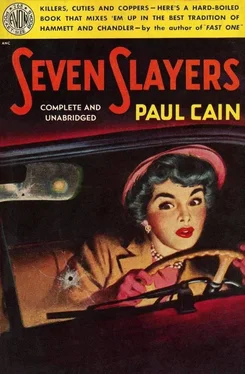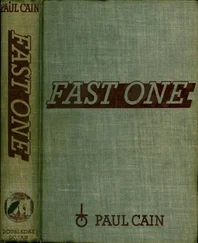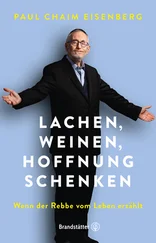The man walked up First Avenue to Thirteenth. He got into a cab on the northwest corner, said, “Grand Central,” and leaned back and looked at his watch.
It was nine minutes after one.
At sixteen minutes after one Tony Maschio came out of the backroom, washed his hands, whistling a curiously individual version of “O Sole Mio,” and turned to grin cheerily at the big bald man who sat reading a paper with his feet propped up on the fender of the stove.
“You are next, Mister Maccunn,” he chirped brightly.
Tony Maschio looked like a bird, a white-faced bird with a bushy halo of black feathers on his head; he spoke with an odd twittering lilt, like a bird.
Maccunn folded his paper carefully and unfolded his big body as careful from the chair, stood up. He was about fifty-five, a very heavily built, heavily jowled Scot with glistening shoe-button eyes, a snow-white walrus mustache.
He lumbered over and sat down in Number One Chair, observed in a squeaky voice that contrasted strangely with his bulk:
“It’s a cold, cold night.”
For eight years Maccunn had come to Tony’s every Friday night at around this time; for eight years his greeting, upon being invited into Tony’s chair, had been: “It’s a cold night,” or “It’s a hot night,” or “It’s a wet night,” or whatever the night might be. When it was any of these things to an extreme degree he would repeat the adjectives in honor of the occasion. Tony agreed that it was a “cold, cold night” and asked his traditional question in turn, with a glittering smile:
“Haircut?”
Maccunn did not have so much as a pin-feather hair on his broad and shining head. He shook it soberly, as was his eight-year habit, closed his eyes, and Tony took up his shears and began trimming the enormous mustache with deft and graceful gusto.
Angelo, who presided over Number Two Chair, was industriously shaving the slack chin of a slight gray-faced youth in overalls. Giuseppe, Number Three, had gone out for something to eat. Giorgio, Number Four, was sitting in his chair, nodding over an ancient number of “The New Art Models Weekly.” There were no other customers in the shop.
At nineteen minutes after one the telephone rang.
Maschio put down his shears and comb and started to answer it.
Angelo said: “If that’s for me, boss — tell her to wait a minute.”
Maschio nodded and put his hand out towards the receiver, and the telephone and wall came out to meet him, the whole side of the shop twisted and curled and was a smothering sheet of white flame, and pain. He felt his body torn apart as if it were being torn slowly and he thought “God! — please stop it!” — and then he didn’t feel any more, or think any more.
Maccunn raised his head once and looked down at the right side of his chest and it seemed curiously flat, curiously distant; he lowered his head and was still. Angelo moaned.
The wind was like an icy wall.
In the reporters’ room of the Ninth Precinct Police Station, Nick Green was playing cooncan with Blondie Kessler, when the Desk Sergeant yelled from the next room:
“Blondie! Pineapple at Tony Maschio’s Barber Shop on Seventh — nothin’ left but a grease-spot!”
Kessler put his cards face down on the table and stood up slowly.
He said very simply: “Dear, sweet Jesus!”
Green looked up at him with elaborately skeptical disdain. “Every time I get a swell hand,” he muttered plaintively, “something happens so you have an excuse to run out on me.”
Kessler, moving towards the door, yipped: “Come on.”
Nicholas, sometimes “St. Nick,” Green was thirty-six — with the smooth tanned skin, bright China-blue eyes of twenty, the snowy white hair of sixty. He was tall and slim and angular, and his more or less severe taste in clothes was violently relieved by a predilection for flaming-red neckties.
His nickname derived from his rather odd ideas about philanthropy. He had been at one time or another a tent-show actor, a newspaperman, gambler, gun-runner, private detective and a few more ill-assorted whatnots, and that wide experience had given him decidedly revolutionary convictions as to who was deserving and who was not.
A stroke of luck combined with one of his occasional flashes of precise intuition had enabled him to snatch a fortune from a falling stock-market and for three years he had used his money and the power it carried to do most of the things young millionaires don’t do. He numbered legmen, Park Avenue debutantes, pickpockets, touts, bank robbers and bank presidents, wardheelers and international confidence-men among his wide and varied circle of friends, and he had played Santa Claus to more than a few of them at one time or another. He found the devious twistings and turnings of politics, the complicated intrigues of the New York underworld exciting, spent more, of his time in night courts than in night-clubs and was a great deal prouder of his accuracy with a Colt .45 than he was of his polo.
He got up and followed Blondie Kessler out of the Reporters’ Room and down the corridor. In his car — a black and shiny and powerful coupe — they careened around the corner and roared north. Green swerved to miss a sleepily meandering cab by inches, asked:
“Now, about this Maschio?”
Blondie was a police-reporter on the Star-Telegram. His hair was as black as St. Nick’s was white. He was a squat stocky Dutchman almost as broad as he was long and he had a habit of staccato, almost breathless expression, particularly when he was a little excited.
“Tony Maschio is — or was — Gino’s brother. He’s run a barber shop where a lot of the town’s big shots go to have their fringes trimmed for eleven or twelve years, an’ he’s been partners with Gino an’ Lew Costain in a high-powered gambling syndicate on the side. His shop was a little bit of a two-by-four joint, but Tony an’ his hand-picked barbers were artists and it was usually full of names from Wall Street or Park Row.”
Kessler was silent a moment; and Green invited: “And...”
“And — Bruce Maccunn, my Managing Editor, has been dropping in at Tony’s for a mustache trim an’ a mudpack every Friday night for as long as I can remember. I’ve located him there a half-dozen times in the last two or three years — late Friday nights.”
Green whistled softly. “And...”
Kessler had no time to answer; the car slid to the curb across the street from the pile of smoking ruins that had been Maschio’s Barber Shop. In spite of the hour, the glacial wind, the usual gallery of morbidly curious had gathered. Several firemen, policemen, and an ambulance squad from the Emergency Hospital were industriously combing the debris of bricks and steel and charred wood.
Kessler was the first reporter on the scene; he scurried about from one to another after information. Green strolled over to join two men who were standing a little way down the street in earnest conversation. One of them was Doyle, a plainclothesman whom he knew slightly, and the other was a wild-eyed Italian who was explaining with extravagant gestures that if he hadn’t lingered in the corner lunchroom for a second cup of coffee he, too, would have been blown to bits. He, it appeared, was Giuseppe Picelli, Tony’s Number Three Barber, and he’d been on his way back to the shop when the explosion occurred.
Green jerked his head towards the heap of wreckage. “How many have they found?”
“Don’t know.” Doyle chewed his unlighted cigar noisily. “Most of ’em are in pieces — little pieces. We’ve identified Tony an’ one of his barbers, but there’s a lot of pieces left over. This guy” — he nodded at Picelli — “says Bruce Maccunn was there — came in jus’ before he left.”
Читать дальше












